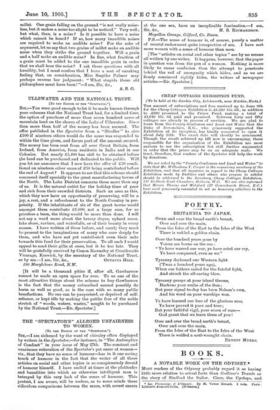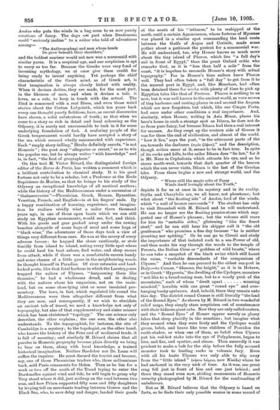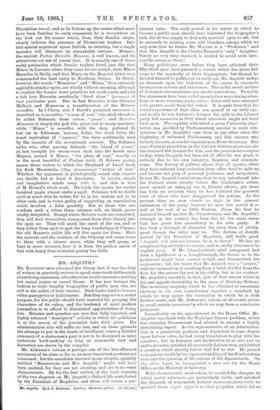BOOKS.
A NOTABLE WORK ON THE ODYSSEY.* MOST readers of the Odyssey probably regard it as having little more relation to actual facts than Gulliver's Travels or the story of Sindbad the Sailor. Circe, the Cyclops, and • Los Phiniciens it L'Odyssee. By M. Victor Berard. 2 vole. Pane: Librairie Armand Colin. [SO francs.] Aeolus who puts the winds in a bag seem to us now purely creations of fancy. The days ape past when Desdemona could "seriously incline" to a suitor who told of adventures among—
"The Anthropophagi and men whose heads Do grow beneath their shoulders," and the boldest mariner would not now woo a nursemaid with similar yarns. It is a sceptical age, and our scepticism is apt to carry us too far. Because the Greeks were very fond of inventing mythology, we at once give them credit for being ready to invent anything. Yet perhaps the chief characteristic of the Greek mind, as of Greek art, is that imagination is always closely linked with reality. When it devises deities, they are made, for the most part,
in the likeness of man, and when it devises a tale, it loves, as a rule, to keep in touch with the actual. The Iliad is concerned with a real Ilium, and even those weird stories about the Cretan -Labyrinth, which ten years back every one thought purely fictitious, have, as recent discoveries have shown, a solid substratum of truth ; so that when we come to a story so rich in detail and local colouring as the Odyssey, it is surely not unreasonable to look in it for some underlying foundation of fact. A seafaring people of the Greek temperament would hardly have accepted a story of the sea which seemed wholly unconnected with experience. Such "empty story-telling," Stra.ho definitely asserts, "is not Homeric " ; the poet may "allegorise or recast," so as to win the popular ear, but be always writes "with knowledge" and is, in fact, "the first of geographers."
On this text M. Victor Berard, the distinguished foreign editor of the Revue de Paris, has written a comment which is a brilliant contribution to classical study. It is his good fortune not only to be a scholar, but a Professor at the Ecole Superieure de Marine, so that he brings to his study of the Odyssey an exceptional knowledge of all nautical matters; while the history of the Mediterranean under a succession of " thalassocracies "—Phoenician, Greek, Roman, Byzantine, Venetian, French, and English—is at his fingers' ends. By a happy combination of learning, experience, and imagina- tion be realises vividly what a sailor three thousand years ago, in one of those open boats which we can still study on Egyptian monuments, would see, feel, and think. With his goods and gear packed away under the rowing benches alongside of some bags of meal and some kegs of "black wine," the adventurer of those days took a view of things very different from ours. He was at the mercy of every adverse breeze ; he hugged the shore cautiously, or stole timidly from island to island, noting every little spot where be could haul his boat ashore, find water, and sleep secure from attack, while if there was a comfortable cavern handy and some chance of a little game in the neighbouring woods he thought himself in Paradise. Of river estuaries and land- locked ports, like that fatal harbour in which the Laestrygones trapped the sailors of Ulysses, "harpooning them like thunnies," he had a wholesome dread, and in dealing with the natives chose his emporium, not on the main- land, but on some close-lying islet or some insulated pro- montory. The laws, in fact, which regulated life round the Mediterranean were then altogether different from what they are now, and consequently, if we wish to elucidate an ancient tale of travel, we need a knowledge not only of topography, but also of that supplementary and sister science which has been christened "topology." The one science only describes, the other explains ; the one sees, the other also understands. To the topographist, for instance, the site of Cambridge is a mystery ; to the topologist, on the other band, who-knows the history of the Fens and of mediaeval trade, it is full of meaning ; and similarly M. Berard claims that all puzzles in Homeric geography become plain directly we bring to bear on them, along with local knowledge, a trained historical imagination. Neither Baedeker nor Dr. Lunn will suffice the inquirer. He must discard the tourist and become, say, one of those Phoenician traders who, three millenniums back, sold Paris ornaments for Helen. Then as he lies for a week or two off the south of the Troad trying to enter the Dardanelles against wind and tide, he will begin to grasp why Troy stood where it did, just midway on the road between two seas, and how Priam supported fifty sons and fifty daughters by levying toll on merchants trading between Greece and the Black Sea, who, to save delay and danger, landed their goods at the south of his "isthmus," to be reshipped at the north, until a certain Agamemnon, whose fortress of Mycenae was placed in a similar spot commanding the land route between the Gulfs of Argos and Corinth, made some pother about a petticoat the pretext for a commercial war. He will understand, too, why Homer knows so much more about the tiny island of Pharos, which lies "a full day's sail in front of Egypt," than the great Oxford critic who remarks that, as it is "less than half a mile" from the coast, "it is hopeless to reconcile Homer's story with actual topography." For in Homer's time sailors knew Pharos well. They had often taken a "full day" to get from it to the nearest port in Egypt, and, like Menelaus, had often been detained there for weeks with plenty of time to pick up Egyptian tales like that of Proteus. Pharos is nothing to us
now, but it was well known to the ancient world, as were scores of tiny harbours and resting-places in and around the Aegean which are now forgotten, but which, like our Cinque Porte, had once under other conditions a real importance. And, similarly, when Homer, writing in Asia Minor, places his hero's home in such a strange spot as Ithaca, he does not do so from pure fancy, but because Ithaca had then a real interest for seamen. As they crept up the western side of Greece it was for them the end of civilisation, and almost of the world. "Low it lies," says the poet, "in the uttermost parts of the sea towards the darkness (r pas Ccisbov)," and the description, though critics sneer at it, seems to be in fact true. In spite of its rocks and hills, to the sailor Ithaca does "lie low," for it is Mt. Nero in Cephalonia which attracts his eye, and as he steers north-west, towards that dark quarter of the heaven which the sun never visits, Ithaca is the last of the Grecian isles. From there begins a new and strange world, and the Odyssey, "Where still the magic robe of Poesy Winds itself lovingly about the Truth,"
depicts it for us at once in its mystery and in its reality. Scylla and Charybdis are, we all know, not phantoms; but what about "the floating isle" of Aeolus, lord of the winds, which "a wall of bronze surrounds" ? The student has only to visit Stromboli with M. Berard and he will understand. He can no longer see the floating pumice-stone which sug- gested one of Homer's phrases; but the volcano still rears for him its "metallic sides," glistening "like the finest steel," and he can still hear his skipper call it "the old gentleman" who promises a fine day because "he is neither grunting nor spitting." Or he can go to Circeii and study the importance of that isolated rock to a sea-Power of old, and then make his way through the woods to the temple of Feronia, the Italian Circe or "goddess of wild beasts," where he can take a snapshot of the black swine which still haunt the ruins, "veritable descendants of the companions of Ulysses." And then he can proceed to the oldest sea-port in
Cumae, "khourna, the height," as it is in Hebrew, or in Greek" Hypereia," the dwelling of the Cyclopes, monsters "not like to a bread-eating man, but to a woody peak of the
mountains," each of whom "dwelt apart meaning mischief," horrible with one great "round eye" and over- . hanging bushy eyebrows. And, behold, there they remain unto this day. The district round Cumae is still literally "Lime land of the Round Eyes." As shown by M. Berard in two wonderful relief maps, they simply stare scepticism out of countenance with their hideous giant orbs. Now they are only called craters, and the "Round Eyes" of Homer appear merely as glassy lakes that sleep placidly in the sunshine ; but imagine what they seemed when they were lively and the Cyclopes would groan, belch, and heave like true children of Poseidon the earth-shaker, or when one of them, as befell when Ulysses put his red-hot stake into the eye of Polyphemus, began to hiss, and fizz, and sputter, and steam. Then assuredly it was prudent to make a bolt for the ship before the fully aroused monster took to hurling rocks in volcanic fury. Even with all his baste Ulysses was only able to slip away from the "little island" (vicros Atixtuf, now Nisida) where he had anchored in the very nick of time. As it was, one great crag fell just in front of him and one just behind ; and there they stand even now, abiding monuments of Homeric, veracity photographed by M. Berard for the confounding of unbelievers.
But as M. Berard believes that the Odyssey is based on facts, so he finds their only possible source in some record of Phoenician travel, and as he follows up the routes which must have been familiar to early commerce, he is everywhere on the look out for names which, from their Semitic origin, clearly indicate the presence of Phoenician traders. Into this special argument space forbids us entering, but a single instance will illustrate its remarkable interest. Monaco, the ancient Port= Herculis Monoeci, is well known, and its attractions are not of recent date. It is exactly one of those rocky peninsulas which Semite traders loved, just like that Minoa in Laconia where they came for sea-purple, their Minoa Heraclea in Sicily, and that Minoa in the Megarid which once commanded the land entry to Northern Greece. In Greek, however, the words " Monoecus " and." Minoa," thus curiously applied to similar spots, are wholly without meaning, although to explain the former some primitive wit made a pun and told a tale how Hercules ascetically "lived alone" (ativoucor) at that particular port. But in fact Hercules is the Oriental Melkart, and • Monoecus a transliteration of the Hebrew 9nenokha. In 1 Chron. xxii. 9 David's promised successor is described as is-menokha, "a man of rest," who shall therefore be called Solomon,: from solant, "peace"; and Hercules Monoecus is simply the god who gives rest to weary mariners, while " Minoa " is menoklia with the deep guttural klt lost (as in Iolthanan, 'Ionivvris, John), the word being the exact equivalent of " reposoir," the term continually used by the corsairs of the seventeenth century. The Sidonian sailor who, after passing Salamis, "the island of peace," at last brought his storm-worn bark into the haven near Megara, named it Minoa, "the place of rest," exactly as in the most beautiful of Psalms (xxiii. 2) Hebrew poetry names those waters to which the Shepherd of Israel leads his flock Me-minoha (Map AvaraUcrfon) "waters of rest." Whether the argument is philologically sound only experts can decide, but at least it fascinates. It carries simple and imaginative minds away with it, and this is true of M. Berard's whole work. He bolds the reader for twelve hundred pages almost under a spell. Scholars will no doubt cavil at much that he writes, for he is too zealous not to be often rash, and is twice guilty of suggesting an emendation which involves a false quantity. But to those who can condone such a crime these volumes will, we think, prove wholly delightful. Except where Hebrew roots are concerned, they will find themselves transported from their library into the open air. They will smell the smell of the sea, and as they follow from spot to spot the long wanderings of Ulysses, the old Homeric sailor life will live again for them. Both the marvels and the realities of the Odyssey will come home to them with a clearer sense, while they will grasp, at least in some measure, how it is from the perfect union of fact with fancy that, immortal poetry has birth.








































 Previous page
Previous page